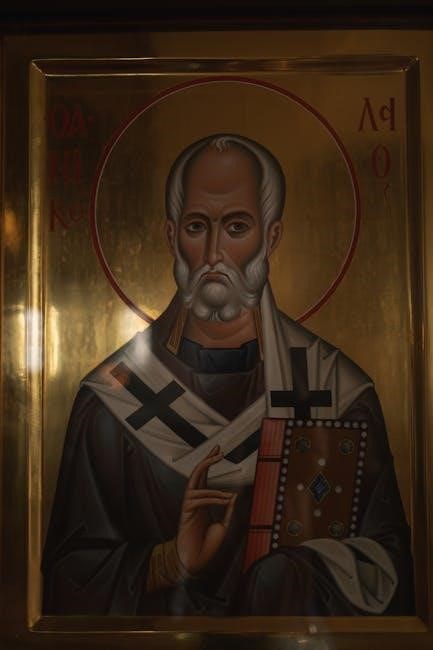filetype:pdf wayne grudem systematic theology
Systematic theology is the organized study of Christian doctrines, providing a comprehensive understanding of biblical truths. Wayne Grudem’s work is a seminal resource in this field.
1.1 Definition and Purpose of Systematic Theology
Systematic theology is the organized, comprehensive study of Christian doctrines, aiming to present a coherent understanding of biblical truths. It involves the analysis and synthesis of Scripture to address theological questions. The purpose is to provide a unified framework for understanding God, humanity, salvation, and the church. Wayne Grudem’s work exemplifies this, offering a structured exploration of Christian doctrine. By examining key themes and their interrelations, systematic theology equips believers to think deeply about their faith, applying biblical principles to life and ministry. It serves as a foundational tool for theological education and discipleship, bridging Scripture and contemporary issues.
1.2 Historical Development of Systematic Theology
Systematic theology has evolved over centuries, shaped by early church fathers, medieval scholastics, and Reformation leaders. The discipline organized Christian teachings into a coherent system, addressing doctrinal controversies and cultural challenges. The Reformation emphasized Scripture’s authority, influencing later theologians like Calvin and Luther. In the modern era, scholars such as Wayne Grudem have advanced systematic theology by integrating biblical exegesis with contemporary issues. This historical development reflects the church’s ongoing quest to articulate timeless truths in changing contexts, ensuring theology remains relevant and grounded in Scripture. Grudem’s work stands as a testament to this enduring tradition, offering a comprehensive framework for understanding Christian doctrine.

Wayne Grudem and His Contributions to Systematic Theology
Wayne Grudem’s contributions to systematic theology are monumental, offering a comprehensive framework that integrates biblical exegesis with contemporary issues, providing profound insights into Christian doctrine.
2.1 Biography of Wayne Grudem
. Grudem has also been a key figure in evangelical debates on gender roles and spiritual gifts. In 2019, he announced his diagnosis with Parkinson’s disease but continues to remain active in ministry and writing.
2.2 Key Features of Grudem’s Systematic Theology
Wayne Grudem’s Systematic Theology is renowned for its accessible and comprehensive approach. It emphasizes the scriptural basis of each doctrine, integrating biblical exegesis with theological reflection. The book is structured to address major theological categories systematically, making it a valuable resource for both scholars and laypeople. Grudem’s commitment to evangelical orthodoxy, combined with his attention to contemporary issues, sets his work apart. Additionally, his clear and engaging writing style has made the book a popular choice for theological education. The text also includes practical applications, ensuring that theological concepts are relevant to everyday Christian living.
2.3 Grudem’s Approach to Biblical Doctrine
Wayne Grudem’s approach to biblical doctrine is characterized by a strong emphasis on scriptural authority and exegesis. He methodically examines each theological topic through the lens of Scripture, ensuring that his conclusions are grounded in biblical text. Grudem’s approach is both systematic and exegetical, as he meticulously organizes doctrines while maintaining a focus on their practical implications. His methodology is accessible, making complex theological concepts understandable for a broad audience. By prioritizing the Bible as the primary source, Grudem’s work remains a trusted resource for understanding Christian doctrine in a clear and biblically faithful manner, reflecting his deep commitment to evangelical theology.

Structure of Grudem’s Systematic Theology
Grudem’s systematic theology is structured to explore key theological categories systematically, emphasizing the role of Scripture in shaping doctrine and providing a coherent framework for understanding Christian theology.
3.1 Overview of the Book’s Organization
Wayne Grudem’s Systematic Theology is meticulously organized to provide a logical and comprehensive exploration of Christian doctrine. The book is divided into several major sections, each focusing on a key theological category, such as the Word of God, the nature of God, humanity and sin, Christ, the Holy Spirit, the church, and future events. Each section is further subdivided into chapters that delve into specific doctrines, ensuring a thorough examination of each topic. Grudem’s approach emphasizes the biblical basis for each doctrine, making Scripture the foundation of his systematic theology. This structured organization allows readers to follow a clear progression of ideas, building a cohesive understanding of Christian theology.
3.2 Major Theological Categories Explored
Wayne Grudem’s Systematic Theology explores numerous theological categories, providing a comprehensive framework for understanding Christian doctrine. Key areas include the nature of God, humanity’s creation and sin, the person and work of Christ, the role of the Holy Spirit, the church’s structure and mission, and eschatological events. Each category is examined through a biblical lens, ensuring a scripturally grounded perspective. Grudem also addresses topics like salvation, spiritual gifts, and the role of women in ministry, offering a well-rounded exploration of theological issues. This breadth ensures that readers gain a holistic understanding of evangelical theology, equipping them to apply these truths practically in their lives and ministries.
3.3 The Role of Scripture in Grudem’s Theology
Scripture occupies a central role in Wayne Grudem’s systematic theology, serving as the ultimate authority for all theological inquiry. Grudem emphasizes the Bible’s sufficiency and clarity, asserting that it provides a comprehensive guide for understanding Christian doctrine. He meticulously grounds each theological concept in biblical texts, ensuring that his teachings align with scriptural truths. Grudem’s approach prioritizes exegesis, interpreting passages in their historical and cultural contexts to derive doctrine. This method ensures that his theology remains biblically faithful and accessible. By elevating Scripture as the foundation, Grudem’s work bridges academic rigor and practical application, making it a valuable resource for both scholars and everyday believers.

Key Doctrines in Grudem’s Systematic Theology
Grudem’s theology explores the nature of God, humanity, sin, salvation, the church, and eschatology, emphasizing biblical authority and its application to Christian living and worship.
4.1 The Doctrine of God
Grudem’s systematic theology thoroughly explores the doctrine of God, emphasizing His attributes, such as omnipotence, omniscience, and benevolence. He underscores God’s trinitarian nature, affirming the distinct yet unified roles of the Father, Son, and Holy Spirit. Grudem also addresses the sovereignty of God, highlighting His divine providence and eternal plan. Scripture is central, as Grudem meticulously references biblical passages to support each theological point. His approach balances academic depth with accessibility, making complex doctrines understandable. The doctrine of God is foundational, shaping Grudem’s discussion of humanity, sin, and salvation. His work reinforces the biblical portrayal of God as both transcendent and immanently involved in creation and redemption.
4.2 The Doctrine of Humanity and Sin
Grudem’s systematic theology delves into the doctrine of humanity, emphasizing that humans are created in God’s image, possessing dignity and moral responsibility. He explores the concept of original sin, tracing it to Adam’s disobedience, which introduced sin and its consequences to humanity. Grudem defines sin as any failure to conform to God’s moral law, whether in thought, word, or deed. He discusses the nature of sin as rebellion against God and its effects on human relationships and divine fellowship. Grudem also examines the biblical teaching on the depravity of humanity, highlighting the need for redemption through Christ, the only remedy for sin.
4.3 The Doctrine of Salvation
Wayne Grudem’s systematic theology thoroughly explores the doctrine of salvation, emphasizing its foundational role in Christian theology. He explains salvation as God’s gracious work to redeem humanity from sin, achieved through Christ’s life, death, and resurrection. Grudem highlights key aspects such as redemption, propitiation, and reconciliation, underscoring Christ’s substitutionary atonement as the centerpiece of salvation. He also discusses justification, sanctification, and glorification, detailing their biblical basis and practical implications. Grudem’s approach emphasizes the sovereignty of God in salvation while affirming human responsibility, providing a balanced view that aligns with Scripture. His treatment of salvation is both doctrinally robust and pastorally relevant.
4.4 The Doctrine of the Church and Last Things
Wayne Grudem’s systematic theology delves into the doctrine of the church, defining it as the body of believers united under Christ’s headship. He explores church government models, advocating for a balanced view between elders and congregational involvement. Grudem also addresses the sacraments, emphasizing baptism and the Lord’s Supper as symbolic acts of grace. Regarding last things, he discusses eschatology, including the rapture, second coming, millennium, final judgment, and eternal state. Grudem’s premillennial perspective is presented alongside other views, providing a comprehensive overview. His approach integrates biblical prophecy with practical implications for Christian living, ensuring a theologically sound and accessible treatment of these doctrines.
Distinctive Features of Grudem’s Theology
Wayne Grudem’s theology emphasizes biblical exegesis, providing a strong scriptural basis for each doctrine. His systematic approach is both comprehensive and accessible, serving academic and lay audiences effectively.
5.1 Emphasis on Biblical Exegesis
Wayne Grudem’s systematic theology is distinguished by its strong emphasis on biblical exegesis. His approach prioritizes the careful interpretation of Scripture, ensuring that each theological conclusion is grounded in the Bible. Grudem meticulously analyzes biblical texts, providing detailed explanations of key passages that underpin his doctrines. This methodological rigor makes his work a reliable resource for both scholars and lay readers. By focusing on the scriptural basis of theology, Grudem ensures that his systematic theology remains faithful to the Bible. His commitment to exegesis also fosters a deep understanding of theological concepts, making his work both accessible and academically robust.
5.2 Grudem’s View on Spiritual Gifts
Wayne Grudem’s systematic theology addresses spiritual gifts with a balanced perspective, advocating for a cessationist viewpoint while acknowledging the Spirit’s ongoing work. He emphasizes the sufficiency of Scripture, arguing that miraculous gifts like prophecy and tongues are not normative today. Grudem distinguishes between miraculous and non-miraculous gifts, asserting that while some gifts ceased with the apostolic era, others continue. His approach encourages believers to focus on permanent edification through teaching and service. This view aligns with his broader theological framework, promoting a biblically grounded understanding of spiritual gifts that prioritizes clarity and edification within the church.
5.3 Grudem’s Perspective on Women in Ministry
Wayne Grudem’s systematic theology presents a complementarian view on women in ministry, asserting that men and women have distinct roles rooted in creation and Scripture. He argues against women serving as elders or pastors, based on biblical texts like 1 Timothy 2:12. Grudem emphasizes male headship in the church and home, while affirming women’s vital contributions in other ministries. His stance, though controversial, reflects a commitment to interpreting Scripture as authoritative and unchanging. This perspective shapes his broader theology, influencing discussions on gender roles and ecclesiastical leadership, while sparking debates within evangelical circles about equality and biblical interpretation.

Practical Application of Grudem’s Theology
Grudem’s systematic theology provides clear guidance for Christian living, emphasizing the transformative power of biblical doctrine in personal and communal life, fostering spiritual growth and service.
6.1 Implications for Christian Living
Wayne Grudem’s systematic theology profoundly impacts Christian living by providing a biblically grounded framework for daily decisions, relationships, and spiritual growth. His emphasis on the transformative power of doctrine encourages believers to live out their faith authentically. Grudem’s teachings on spiritual gifts, for instance, empower Christians to serve the church effectively, while his insights on sin and salvation offer guidance for personal holiness. By integrating theology into everyday life, Grudem equips believers to navigate challenges with a clear conscience and a deep reliance on God. His work fosters a practical understanding of how to live out one’s faith in a way that honors God and enriches the community. Grudem’s systematic theology serves as a valuable resource for believers seeking to apply biblical truths in their lives, ensuring that theology remains both accessible and relevant. This approach encourages Christians to embrace their faith as a lived experience, shaping their thoughts, actions, and relationships in light of biblical doctrine. By bridging the gap between theological concepts and practical application, Grudem’s work empowers believers to live intentionally and purposefully, rooted in the teachings of Scripture.
6.2 The Role of Theology in Everyday Life
Theology plays a vital role in everyday life by shaping how Christians understand and interact with the world. Grudem’s systematic theology emphasizes that theological truths are not abstract concepts but practical guides for daily living. By understanding doctrines such as God’s sovereignty, sin, and salvation, believers gain a framework for making decisions, facing challenges, and fostering relationships. Theology informs how Christians view work, family, and community, encouraging a life of worship and service. Grudem’s work highlights the transformative power of applying biblical doctrine to everyday situations, enabling believers to live intentionally and purposefully. This integration of theology and life ensures that faith is lived out authentically and meaningfully. Grudem’s systematic theology serves as a bridge between doctrine and practice, empowering Christians to navigate life’s complexities with a clear biblical perspective. Through this lens, theology becomes a powerful tool for living out one’s faith in every aspect of life. By applying theological truths, believers can experience spiritual growth, deepen their relationship with God, and impact the world around them. Grudem’s work underscores the importance of theology in shaping a life that honors God and reflects His grace. Theology, as presented by Grudem, is not just for academics but for every believer seeking to live a life grounded in biblical truth. This approach ensures that theology remains relevant and impactful in the daily lives of Christians, guiding them in their thoughts, actions, and decisions. By emphasizing the practical application of doctrine, Grudem’s systematic theology equips believers to live out their faith in a way that is both authentic and transformative.

Reception and Impact of Grudem’s Systematic Theology
Grudem’s systematic theology is widely acclaimed as a comprehensive resource, shaping evangelical thought globally; Its clarity and biblical focus have made it a foundational text for many seminaries and pastors.
7.1 Academic and Popular Reception
Wayne Grudem’s Systematic Theology has received widespread acclaim for its clarity and depth. Academically, it is highly regarded as a comprehensive resource for theological studies, widely adopted in seminaries. Its accessible style also appeals to lay readers, making it a popular choice for personal study and church use. The book’s emphasis on biblical exegesis and practical application has contributed to its broad acceptance. Grudem’s work is often praised for bridging the gap between scholarly theology and everyday Christian living, ensuring its relevance across diverse audiences. Its enduring popularity underscores its significance in modern evangelical thought and practice.
7.2 Critiques and Controversies Surrounding Grudem’s Theology
Despite its popularity, Wayne Grudem’s Systematic Theology has faced critiques, particularly regarding his views on gender roles and spiritual gifts. Some scholars argue his interpretation of biblical texts on women in ministry is overly restrictive. Additionally, Grudem’s cessationist-leaning perspective on certain spiritual gifts, like prophecy, has sparked debates within charismatic and Pentecostal circles. Critics also note his strong Calvinistic tendencies, which may not resonate with Arminian or Wesleyan traditions. Grudem’s firm stance on these issues has led to both support and opposition, highlighting the diverse theological landscape within evangelicalism. These controversies, however, have not diminished the book’s influence, as it remains a key reference in theological discussions.
7.3 Influence on Modern Evangelical Theology
Wayne Grudem’s Systematic Theology has profoundly shaped modern evangelical theology, offering a clear, accessible framework for understanding biblical doctrine. Its emphasis on exegesis and application has made it a foundational text in seminaries and churches worldwide. Grudem’s work has influenced discussions on gender roles, spiritual gifts, and salvation, providing a theological basis for various evangelical positions. His approach has also encouraged laypeople to engage deeply with theology, bridging the gap between academia and the church; As a result, Grudem’s theology continues to be a pivotal resource, guiding both scholars and believers in their understanding of Christian doctrine and its practical implications.
Wayne Grudem’s Systematic Theology remains a cornerstone of evangelical scholarship, offering a meticulous and accessible exploration of Christian doctrine, ensuring its enduring relevance for future generations.
8.1 Summary of Grudem’s Systematic Theology
Wayne Grudem’s Systematic Theology is a comprehensive resource that systematically explores Christian doctrine through biblical exegesis. Organized logically, it covers topics from the nature of God to eschatology, emphasizing scriptural authority. Grudem’s approach bridges academic rigor and accessibility, making complex theology understandable for various audiences. His work integrates theological disciplines, providing a holistic view of Christian beliefs. The book’s structure and emphasis on biblical doctrine ensure its relevance for both scholars and laypeople, solidifying its place as a foundational text in evangelical theology. Grudem’s systematic approach ensures clarity and coherence, making it an invaluable tool for theological study and application.
8.2 The Enduring Relevance of Grudem’s Work
Wayne Grudem’s Systematic Theology remains a cornerstone of evangelical thought, offering timeless insights into Christian doctrine. Its enduring relevance lies in its meticulous biblical exegesis, clear organization, and accessibility to both scholars and laypeople. Grudem’s work addresses contemporary theological debates, such as spiritual gifts and gender roles, with balanced scholarship. His emphasis on the authority of Scripture ensures its alignment with evangelical convictions. As a foundational text, it continues to shape theological education and personal study, guiding believers in understanding and applying doctrine. Grudem’s legacy endures as his work equips the church to engage with theology thoughtfully and biblically in an ever-changing world.